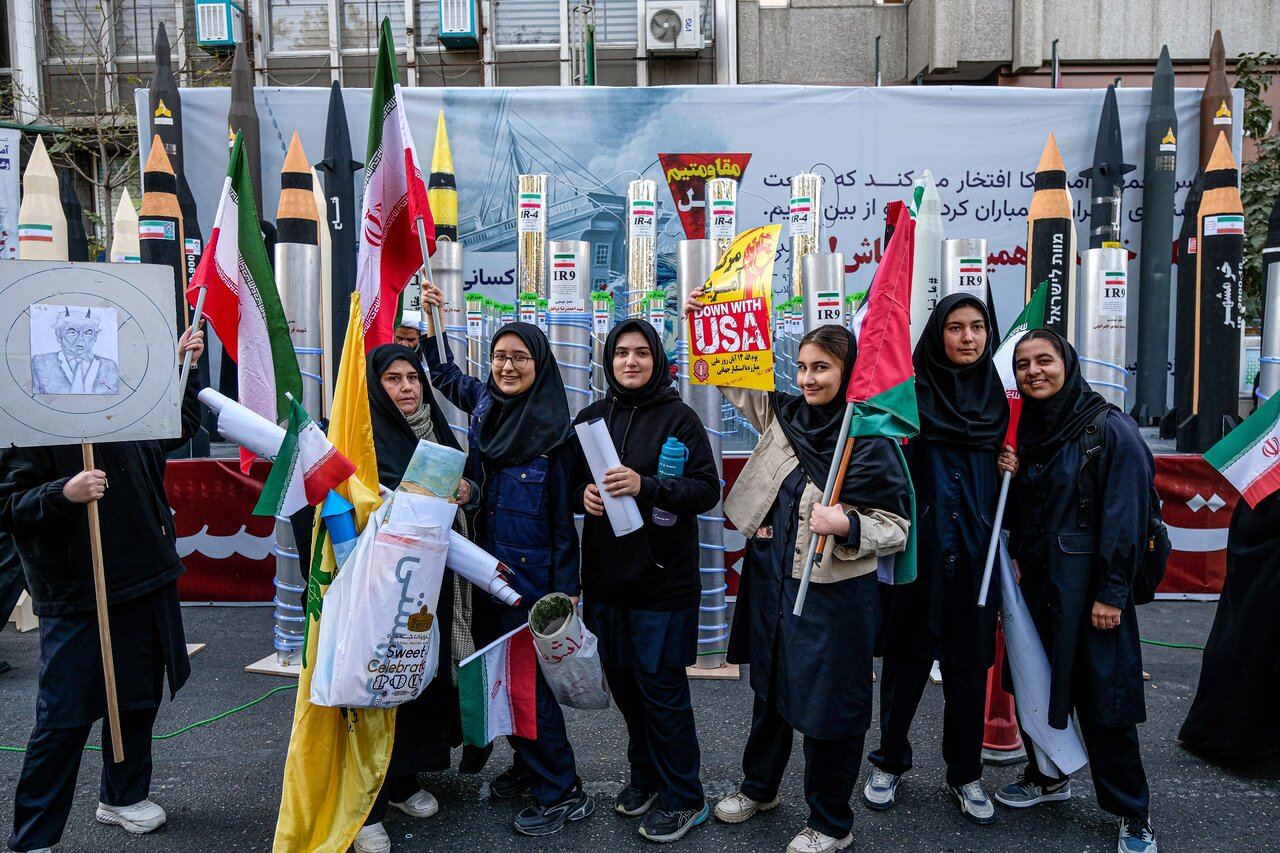The spirit of 13 Aban still marches
Hundreds of thousands of students across Iran mark National Day of ‘Fight against Global Arrogance’

TEHRAN – Hundreds of thousands of Iranians poured into the streets of Tehran and more than 900 cities nationwide on Tuesday to mark the anniversary of the 1979 U.S. Embassy takeover, an event officially known as the National Day of Fight against Global Arrogance.
Students, youth, clerics, and families participated in the rallies, which featured chants against the United States and Israel, including slogans such as “Death to America” and “Death to Israel.” Demonstrators carried Iranian flags and portraits of martyrs killed in U.S. and Israeli acts of aggression, including the “12-day war” against Iran last June.
In Tehran, the central march began at Palestine Square and advanced toward the site of the former U.S. embassy—now referred to as the “Den of Espionage”—where speeches, religious recitations, and the reading of an official resolution took place. A symbolic trial of the U.S. President Donald Trump and Israeli Prime Minister Benjamin Netanyahu was staged during the event.
Along the procession route, cultural and political exhibitions were held, depicting decades of Western and Israeli “crimes” against Iran and other nations. Symbolic displays of Iranian missiles and centrifuges lined the streets, while U.S. and Israeli flags were set on fire as part of ritualized acts of defiance.
The official resolution, read at the Tehran gathering, characterized the 13th of Aban as a defining moment in the Islamic Republic’s struggle against global hegemony. It emphasized the day as both a remembrance of student and youth sacrifices during the Islamic Revolution and a reaffirmation of Iran’s ongoing resistance to U.S. and Israeli domination.
The statement reiterated Iran’s commitment to defending Palestinian rights, supporting global movements opposing foreign intervention, and maintaining military, scientific, and economic self-reliance. Participants pledged loyalty to the leadership of Ayatollah Seyyed Ali Khamenei and vowed to uphold the values of the Islamic Revolution as essential to safeguarding Iran’s sovereignty and dignity.
Armed forces remind enemies of ‘painful blows’ during 12-day war
In a statement marking the anniversary, the General Staff of the Armed Forces declared that Iran’s enemies “know well” they have lost the ability to commit further aggression following the “painful blows” they received during the 12-day conflict.
“Due to the unity and solidarity of the Iranian nation, the readiness of the Armed Forces, and above all the divine resolve of the Supreme Leader of the Islamic Revolution, the enemy now seeks to suspend the steadfast Iranian people in a state of ‘neither war nor peace,’” the statement read.
The communiqué described the 13th of Aban as a day marking milestones that paved the way for the Islamic Revolution—the 1964 exile of Imam Khomeini, the killing of protesting students in 1978, and the 1979 embassy takeover. It accused the United States and Israel of “spreading fear through media warfare” to achieve objectives unattainable on the battlefield.
The General Staff reaffirmed that the Iranian Armed Forces stand “united in defense of the sacred homeland,” prepared to “strike a decisive blow” against any aggressor.
IRGC says U.S. policy built on infiltration
The Islamic Revolution Guard Corps (IRGC), also in its own statement, called the takeover of the U.S. embassy “a strategic choice between resistance and surrender.” It claimed documents seized from the embassy revealed the U.S. diplomatic mission was “a CIA station for intelligence and operational activities” rather than a site of legitimate diplomacy.
“In the eyes of the United States, diplomacy is not a tool for engagement but a cover for infiltration, deception, and subversion,” the IRGC said, accusing Washington of pursuing a consistent strategy of pressure and interference since the 1953 coup against Prime Minister Mohammad Mosaddegh.
The statement also referenced the 12-day war, saying recent U.S. behavior demonstrated a continuation of “a stable pattern of hostility” toward Iran. It called on Iranian youth to “renew their unity and resolve against global arrogance, as during the Sacred Defense” in the 1980s.
Faith over fear
Rear Admiral Habibollah Sayyari, the Deputy Commander of the Iranian Army for Coordination Affairs, echoed calls for national unity, identifying “faith, cohesion, and loyalty to leadership” as the keys to Iran’s success. Addressing demonstrators in Zanjan, he said: “Arrogance is our enemy and brings us no benefit. What will solve our country’s challenges is revolutionary thinking—trust in God, reliance on domestic capabilities, courage, and innovation.”
Observed annually as both Student Day and the National Day of Anti-Arrogance, the 13th of Aban marks three pivotal events in Iran’s modern history: Imam Khomeini’s 1964 exile to Turkey, the 1978 killing of student protesters, and the 1979 seizure of the U.S. embassy.
For many Iranians, the day stands as a symbol of national independence, resistance, and defiance against foreign domination—principles that continue to shape the Islamic Republic’s political identity and foreign policy decades after the Revolution.
